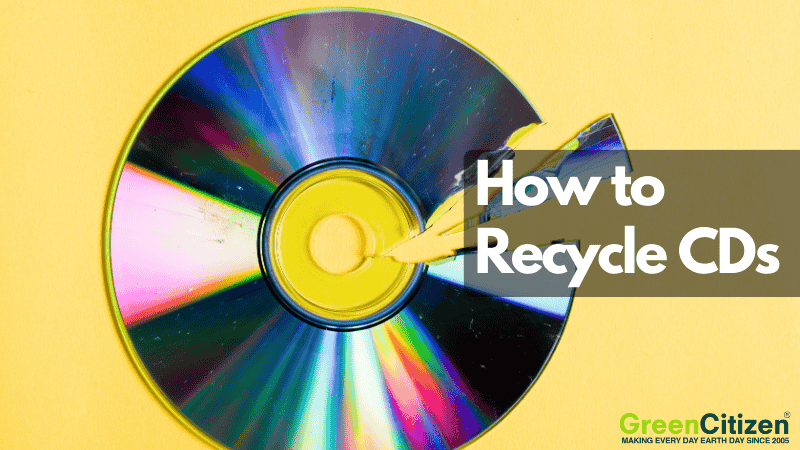Ah, CDs! Remember them?
They were our go-to for music, movies, and more. But what do we do with them now? Instead of letting them gather dust or, worse, throwing them in the trash, let’s talk recycling.
Can you recycle CDs? Absolutely! And here’s why you should.
CD recycling keeps our planet cleaner by preventing them from piling up in landfills. Plus, you can significantly reduce plastic pollution. All you need is a bit of motivation to do something good for this world.
So, let’s dive into the world of CD recycling together. It’s easy, it’s important, and it’ll make you feel good about clearing out that old collection. Plus, you’ll be doing the earth a favor. Ready to learn more about saving the environment one CD at a time?
Can You Recycle CDs?
Absolutely, you can recycle CDs! It’s a common misconception that CDs are non-recyclable, a myth that I am eager to debunk right here. While it’s true that you can’t just toss them into your local curbside recycling program’s bin, there are indeed avenues available for recycling CDs.
You should try giving them a new purpose and preventing them from becoming environmental hazards.
Mainly, because of the composition of CDs, they require a specialized recycling process, different from the one used for common household items. This means that throwing them in the curbside recycling bin along with your regular recyclables is not the way to go.
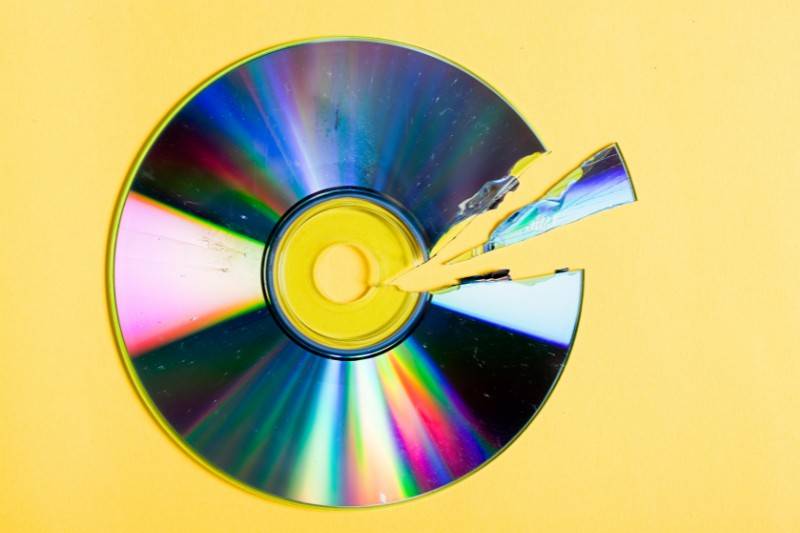
Now, you might be wondering about other items like VHS tapes, which share a similar fate to old CDs. Just like CDs, VHS tapes are also recyclable, but again, not through the conventional channels.
Interestingly, the recycling process for CDs and VHS tapes can involve breaking them down into raw materials, which can then be used to manufacture a variety of products, including office equipment and even new discs. Yes, your old CDs and even burned CDs can find a new life, contributing to a circular economy where waste is significantly reduced.
So, the next time you come across a pile of old CDs or VHS tapes while cleaning out your storage, remember that they don’t have to end up in a landfill. There are specialized facilities dedicated to recycling CDs and other similar items, ensuring that the materials are reused and repurposed in the most environmentally friendly way possible.
What are CDs Made Of?
As we delve deeper into the world of CD recycling, it’s essential to understand the very fabric of CDs – what are they made of? Understanding the composition of CDs not only gives us insight into the world of technology but also guides us in the right direction when it comes to recycling them.
Primarily, CDs are crafted from a blend of polycarbonate plastic and aluminum. The polycarbonate plastic forms the disc’s base, providing a clear medium to store data.
This plastic is derived from crude oil and natural gas, making it a significant player in the fossil fuel industry. On the other hand, a thin layer of aluminum is used to reflect the laser used in reading the disc, playing a crucial role in the CD’s functionality.
Here is a complete list of components used in manufacturing CDs:
- Polycarbonate plastic: Forms the physical disc, derived from fossil fuels.
- Aluminum: Used for reflecting the laser that reads the data.
- Lacquer: A layer that seals the aluminum and protects it.
- Artwork/Label: Often made from paper or printable material, it adorns the non-playing side of the CD.
- CD Cases/Jackets: These can be made from a variety of materials including jewel cases made of plastic, paper sleeves, or even cardboard.
A Short History of CDs and DVDs
A brief stroll down the history lane tells us that CDs, also known as compact discs, revolutionized the way we stored and accessed data.
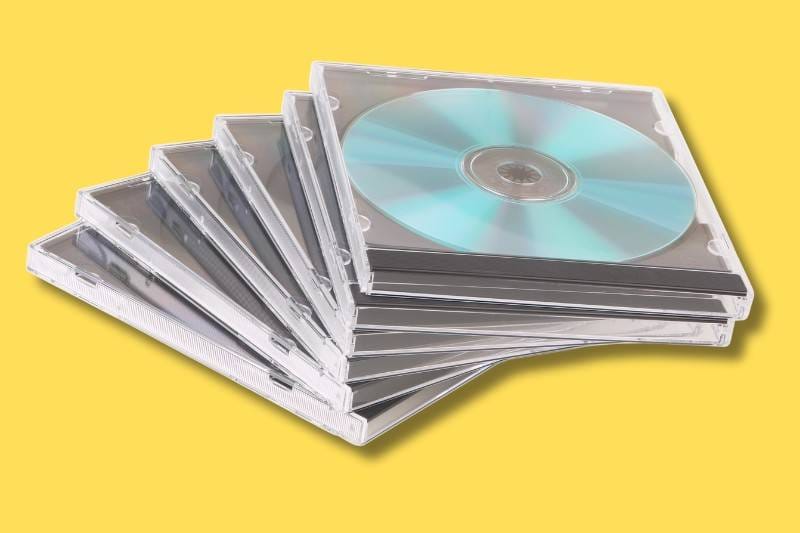
Introduced in the early ’80s, CDs became a popular medium for music, superseding vinyl records and cassette tapes. They offered a compact, digital format for music CDs, and later for CDs and DVDs that stored a variety of data, including movies and software.
As we move forward in our journey of understanding CD recycling, it is pivotal to note that while CDs brought a revolution, they also added to the e-waste dilemma. The non-biodegradable nature of polycarbonate plastic means that it doesn’t completely decompose, posing a significant environmental challenge.
How Long Does It Take for CDs to Decompose?
It is estimated that a CD would take over 1 million years to completely decompose in a landfill. Yes, you read that right, a million years. This is because CDs are made from plastic resins which are incredibly durable and resistant to breaking down naturally.
The longevity of CDs in landfills contributes to a growing waste problem, with millions of music CDs being discarded every year, not to mention other discs like DVDs that share a similar fate.
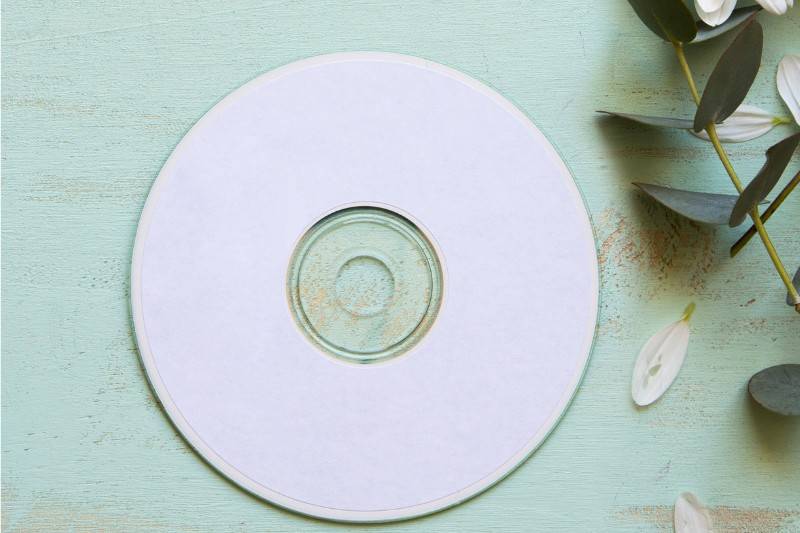
To fully grasp the gravity of the situation, let’s first understand the resources that go into making CDs. Manufacturing a pound of plastic, which equates to around 30 CDs, demands a substantial amount of resources: 300 cubic feet of natural gas, 2 cups of crude oil, and a whopping 24 gallons of water.
This not only highlights the significant environmental footprint of CDs but also underscores the urgent need for recycling these discs to mitigate their impact on our planet.
This alarming fact is further exacerbated when we consider the sheer volume of CDs and DVDs that end up in landfills and incinerators annually. More than 5.5 million boxes of software find their way to these waste disposal sites, releasing potentially toxic fumes into the environment and posing a serious threat to ecological balance.
But it’s not all doom and gloom.
The silver lining here is that we have the power to change this narrative through conscious recycling efforts. CDs, despite being composed of materials that are not easily recyclable through conventional methods, can indeed be recycled into a variety of products, including street lights, auto parts, and even ice scrapers.
How to Recycle CDs
Recycling CDs is not just a step towards a sustainable future, but it is also a way to declutter and make space for the new while ensuring the old CDs don’t end up harming the environment. Here, I will guide you through a step-by-step process on how to prepare your CDs for recycling and where to take them.
Step 1: Sort and Clean Your CDs
Begin by sorting your CDs and DVDs, separating them from their cases. Clean them properly to remove any dust or dirt accumulated over the years.
Step 2: Choose the Right Recycling Path
You have various options when it comes to recycling CDs. You can opt for specialized recycling centers or mail-back programs. These recycling centers are far better than your local curbside recycling program. They have special machines are qualified technicians who excel in recycling CDs and DVDs.
If you live in the San Francisco Bay Area, you can visit our Burlingame EcoCenter. We’d be happy to take care of your old CDs, DVDs, and VHS tapes. You can also use our mail-in programs.
Moreover, our Green Directory can help you find recycling facilities near you.
Step 3: Donation
Donation is a fantastic option when it comes to recycling. You can donate your CDs to thrift stores, libraries, or even schools where they can be reused. You can also visit Salvation Army or your nearby thrift stores. Record stores should also be helpful in this case. They typically accept DVDs or CDs.
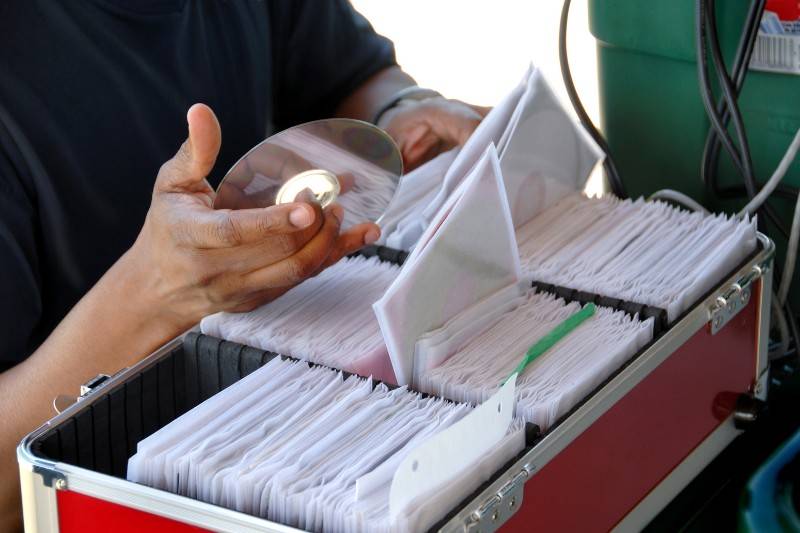
Step 4: Repurpose Your CDs
If you are feeling creative, you can repurpose your old CDs into art projects or functional items, giving them a second life and preventing them from ending up in a landfill.
Step 5: Selling Your CDs
If your CDs are in good condition, consider selling them online or at a yard sale. Platforms like eBay and Amazon can be great places to sell old CDs and DVDs, helping you make some money while ensuring the CDs find a new home.
Step 6: Preparing CD Cases for Recycling
Don’t forget about the CD cases. They can be recycled too. Separate the paper inserts from the plastic cases, and recycle the paper with your regular paper recycling. The plastic cases, often made from type #6 plastic, can be recycled at facilities that accept this type of plastic.
Step 7: Reach Out to Local Recycling Programs
Lastly, check with your local recycling program to see if they accept CDs and their cases for recycling. Some programs have specific guidelines on how to recycle these items, so it’s always best to check with them first.
By following these steps, you not only contribute to reducing e-waste but also promote a culture of recycling, fostering a healthier planet.
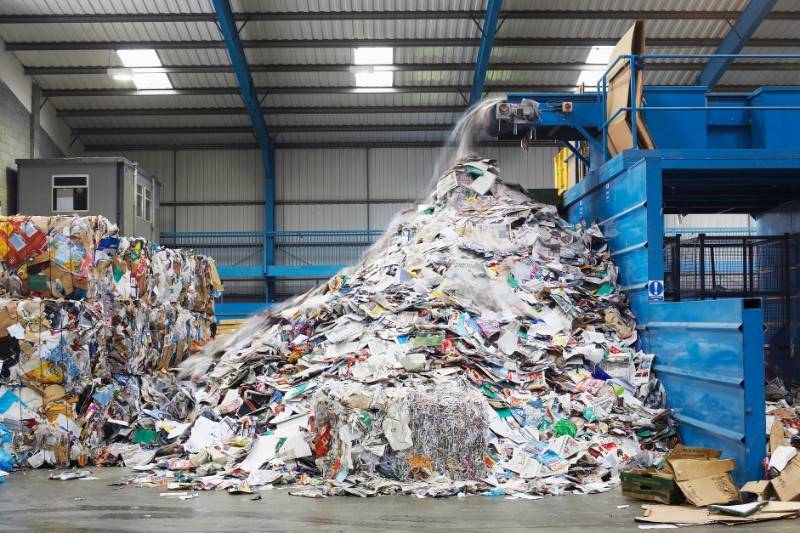
Can You Recycle CD Cases?
As we continue to explore the world of CD recycling, it is essential to also address the recyclability of CD cases. CD cases come in various forms, and understanding how to recycle or repurpose them is a vital part of our recycling endeavor. Let’s delve into the different types of CD cases and how you can handle them responsibly.
Types of CD Cases and Their Recyclability
Jewel Cases
These are the most common types of CD cases, made from a hard plastic known as polystyrene. While not all recycling centers accept them, many do. It is advisable to check with your local recycling facility to see if they accept polystyrene products.
Digipaks
Unlike jewel cases, digipaks are primarily made from cardboard, with a plastic tray to hold the CD. The cardboard part is easily recyclable with other paper products, while the plastic tray can be recycled with other plastic items, provided your local recycling facility accepts this type of plastic.
Slim Cases
These are similar to jewel cases but thinner. They are made from the same material as jewel cases and can be recycled in the same way.
Paper Sleeves
These are the most eco-friendly option, made entirely from paper. They can be recycled with other paper products or even composted.
Recycling and Repurposing CD Cases
When it comes to recycling CD cases, it is important to separate the different components (like removing paper inserts from jewel cases) to facilitate the recycling process.
If recycling is not an option in your locality, consider repurposing the cases. They can be used for various DIY projects, such as picture frames, or storage solutions for small items.
In conclusion, while CD cases can indeed be recycled, the process varies depending on the type of case. It is always a good practice to check with your local recycling facility to understand the specific guidelines for recycling CD cases in your area.
How to Upcycle Old CDs
As we venture further into the world of CD recycling, it’s time to spark some creativity and explore the exciting opportunities that upcycling offers. Upcycling, or creatively reusing old items, allows us to give a second life to our old CDs, transforming them into something new and functional. Here, I will share some inventive ideas to help you upcycle your old CDs.
Art Projects
- Mosaic Art: Break your old CDs into pieces and use them to create stunning mosaic art pieces. The reflective surface of the CDs adds a sparkling effect to your artwork.
- CD Sculptures: Stack and glue CDs together to form interesting sculptures. You can paint them to add a personal touch.
- Wind Chimes: Create a beautiful wind chime using old CDs, string, and beads. Hang it in your garden or balcony to add a whimsical touch to your outdoor space.
Practical Household Items
- Coasters: Turn your old CDs into coasters to protect your furniture from stains. You can decorate them with fabric or paint to match your home décor.
- Garden Decor: Use CDs to create reflective garden décor that not only beautifies your garden but also helps in keeping birds away from your plants.
- Mirror: Create a decorative mirror by gluing pieces of broken CDs around a round mirror. The CDs will give a shimmering frame effect, adding a unique touch to your space.
Educational Tools
- Learning Aids: Old CDs can be used to create learning aids for children. You can paint them with different colors and write alphabets or numbers on them to make learning fun.
- Solar System Model: Create a solar system model using CDs for a school project. Paint the CDs to represent different planets and hang them from a hanger to create a 3D model of the solar system.
Personal Accessories
- Jewelry: Craft unique jewelry pieces using pieces of CDs. You can make earrings, necklaces, or bracelets with the shiny, iridescent pieces of the CDs.
- Bag Decor: Customize your bags by attaching pieces of CDs to them. It will give your bag a funky and unique look.
As you can see, the possibilities are endless when it comes to upcycling CDs. It’s all about letting your creativity flow and coming up with innovative ways to reuse old CDs. Not only does upcycling help in reducing waste, but it also allows you to create something new and beautiful from something old.
Conclusion
As we wrap up our guide on CD recycling, it’s evident that small, conscious actions can pave the way to a sustainable future. The act of recycling and upcycling CDs not only mitigates environmental harm but also unveils a realm of creativity, allowing us to find value in what we once considered waste.
We encourage you to embrace the insights garnered from this guide, transforming your old CDs into avenues of creativity and responsibility. Each CD diverted from a landfill is a stride towards a healthier planet.
Let’s foster a future where sustainability is not just a choice but a lifestyle, championed one CD at a time.

